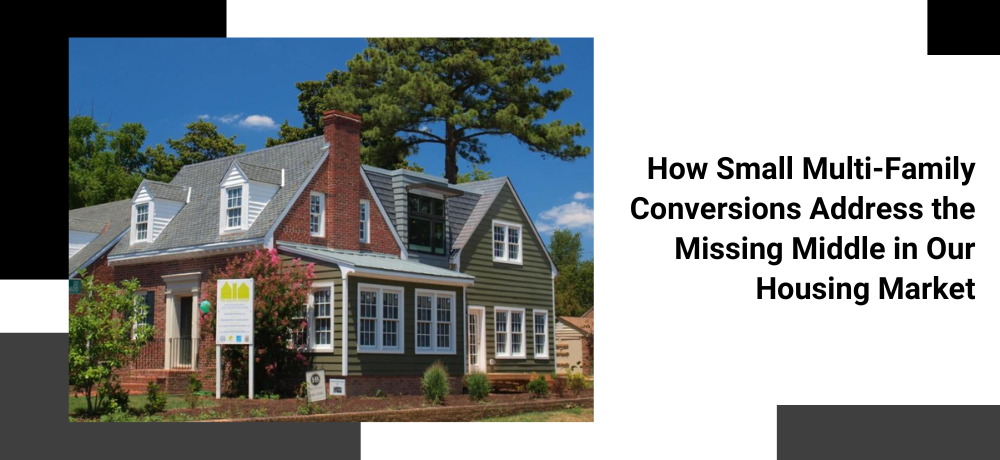
How Small Multi-Family Conversions Address the Missing Middle in Our Housing Market
- R. MICHAEL CROSS DESIGN GROUP
As the housing market grapples with challenges ranging from affordability to availability, small multi-family conversions emerge as a compelling solution. In this blog, we'll explore the concept of the "Missing Middle," the advantages of small multi-family conversions, and how this innovative approach addresses the diverse needs of today's housing market.
Affordability and Diversity in Housing Options:
Small multi-family conversions stand as a pivotal strategy for addressing the "missing middle" in the housing market by specifically targeting affordability and diversifying housing options. Through the transformation of existing structures such as duplexes and triplexes, these projects inherently lend themselves to cost-effectiveness, making homeownership or rental opportunities accessible to a broader spectrum of middle-income households. This emphasis on affordability not only broadens housing choices but also contributes to a more inclusive and economically diverse residential landscape.
Neighborhood Revitalization through Housing Initiatives:
The conversion of small multi-family units plays a significant role in the revitalization of neighborhoods, especially those that may have experienced a decline in recent times. By repurposing underutilized or vacant properties, these initiatives breathe new life into communities, transforming them into vibrant and desirable places to live. This housing-focused revitalization not only positively impacts current residents but also attracts new ones, fostering a sense of community pride and economic stability.
Balancing Urban Density without High-Rise Impact in Housing:
A key attribute of small multi-family conversions is their ability to address the missing middle by increasing urban density without resorting to the impact of high-rise developments. These projects provide a balanced approach to urban planning, offering more housing units within the existing footprint. This sustainable and thoughtful increase in density contributes to a harmonious urban landscape that accommodates a variety of housing types, meeting the diverse needs of the population.
Flexibility and Adaptability in Housing Solutions:
The adaptability and flexibility inherent in small multi-family conversions offer a dynamic response to the changing needs of communities. This aspect of housing development ensures that the projects can be tailored to the specific demands of the local housing market. Whether it involves adjusting unit sizes, incorporating sustainable features, or integrating community spaces, this flexibility contributes to the creation of housing solutions that are not only responsive to immediate needs but also adaptable to future shifts in the housing landscape.
Promoting Community Integration through Thoughtful Housing Design:
Unlike large-scale developments that may disrupt the local fabric, small multi-family conversions prioritize community integration through thoughtful housing design. These projects are characterized by a meticulous consideration of the scale, aesthetics, and functionality that align with the existing neighborhood character. This emphasis on seamless integration fosters a sense of belonging among residents, contributing to the development of strong, cohesive communities that thrive through collaborative and shared living spaces.
Homeownership Opportunities and Wealth Building through Housing Development:
Small multi-family conversions often provide unique opportunities for homeownership within the missing middle segment of the housing market. Whether through the creation of condominiums or the subdivision of larger structures into individual units, these initiatives empower individuals and families to enter the housing market as owners. This not only addresses the immediate need for housing but also contributes to long-term community stability and wealth-building for residents, creating a positive cycle of investment and prosperity within the community.
Meeting the demands of an ever-growing housing market can be daunting. However, using existing infrastructure to increase density not only combats displacement of existing residents, but the concern of suburban sprawl. Providing more affordable units in desirable parts of the city encourages residents to stay downtown and engage in their communities. Further, providing units within existing lots and buildings alleviates the need to create oversized apartment buildings within neighborhoods. Working in DC for well over a decade, RMCDG has strived to provide units throughout the city that are well designed and thoughtful additions to existing structures, creating the missing middle options so many buyers are looking for.
Join us in reshaping the housing market. Contact R. MICHAEL CROSS DESIGN today to explore investment opportunities in small multi-family conversions.
To learn more about the services we offer, please click here. To contact us, click here or call us at (202) 536-3006.
